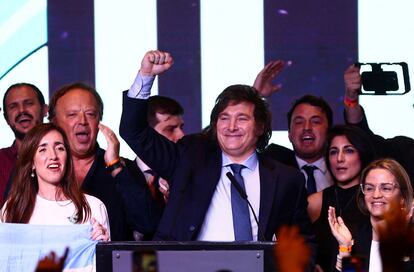Argentina elections: Sergio Massa contains far-right wave, defeating Javier Milei in the first round
The economy minister won 36.6% of the vote, while his rival secured 30%. They will both try to win over the voters for Patricia Bullrich, who came in third place and was knocked out of the race

Against all odds, Sergio Massa won the first round of the presidential elections in Argentina on Sunday. Winning 36.6% of the vote, the economy minister put a stop to the far-right tsunami. Javier Milei, the political phenomenon who burst into Argentine politics ready to break everything with a chainsaw, won 30%. The two will head to the runoff on November 19.
The results of the first round of the presidential election was a miracle for Massa and a frustration for Milei, who was hoping to win the elections outright (by winning 45% or reaching 40% with a difference of 10 points over the runner-up). In the case of Massa, the victory was particularly miraculous given the dire economic state of the country, where inflation is at 140%, 40% of people live in poverty and the Central Bank is in the red.
At the end of the day, the fear of Milei was greater than voters’ anger at the government. Coming in third place was Patricia Bullrich, from Juntos por Cambio (Together for Change), the alliance that brought Mauricio Macri to power in 2015. The former security minister won 23.8% of the votes and was knocked out of the race. It is a historic defeat for Argentina’s traditional right, which did not see Milei coming and is struggling to staunch its decline.
In the mandatory primary elections in August, Massa had come in third place, behind Milei and Bullrich. His success at Sunday’s vote lies in the province of Buenos Aires, specifically in Greater Buenos Aires, the conurbation surrounding the capital which is home to 24% of voters. This is where Massa — the candidate chosen by the left-wing Peronist political movement — narrowed the difference with his rivals, vote by vote.
The conurbation is the most populous in the country and also the poorest. Peronism was born in these working class neighborhoods 80 years ago, and since then it has swept the polls. Milei seemed to question Peronism’s stronghold, promising to put an end to social plans, education and public health and throw tens of thousands of state employees on the street. But the winds appeared to change, with Massa gaining more than two million votes between the August primaries and the first round on Sunday.

On Monday, Massa and Milei will begin fighting to win over those who voted for Bullrich. On the one hand, many supporters for her Together for Change coalition are deeply anti-Peronist and would never vote for Massa or any other leader from that group. Indeed, Milei is already trying to sway these voters. “Beyond our differences we have to understand that we have a criminal organization in front of us, Kirchnerism is the worst thing that has happened to Argentina,” he said, in reference to the political movement based on the ideas of former presidents, Néstor Kirchner and Cristina Fernández de Kirchner, which is considered a branch of Peronism.
On the other hand, there are Together for Change voters who are willing to put their anti-Peronist stance to the side if they consider Milei an institutional threat. Massa addressed this sector on election night: “I want to speak to those thousands of radicals who share with us democratic values such as public education and the independence of powers. I am going to make every effort in the next 30 days to earn your trust.”
Milei, meanwhile, will try to soften his image. During the campaign, he rallied against “the political caste,” making no distinctions between the politicians of different parties. What’s more, his main campaign promise — to dollarize the economy in a bid to end inflation — is no longer met with the same enthusiasm by his economists, many of whom designed the convertibility law that fixed the exchange rate of the peso with the dollar in the 1990s. Milei has stopped talking about approving the sale of organs and children, but he continues to discuss legalizing the free carrying of weapons.

Massa also faces challenges ahead of the runoff on November 19, with inflation skyrocketing and the peso plummeting. Argentines who can do so turn to the dollar, the scarcest asset in the South American country’s economy. Last week, Massa received help from China, which gave Argentina a $6.5 billion loan to keep the administration going until at least the runoff vote. But at least he can be pleased with Sunday’s results.
Sign up for our weekly newsletter to get more English-language news coverage from EL PAÍS USA Edition
Tu suscripción se está usando en otro dispositivo
¿Quieres añadir otro usuario a tu suscripción?
Si continúas leyendo en este dispositivo, no se podrá leer en el otro.
FlechaTu suscripción se está usando en otro dispositivo y solo puedes acceder a EL PAÍS desde un dispositivo a la vez.
Si quieres compartir tu cuenta, cambia tu suscripción a la modalidad Premium, así podrás añadir otro usuario. Cada uno accederá con su propia cuenta de email, lo que os permitirá personalizar vuestra experiencia en EL PAÍS.
¿Tienes una suscripción de empresa? Accede aquí para contratar más cuentas.
En el caso de no saber quién está usando tu cuenta, te recomendamos cambiar tu contraseña aquí.
Si decides continuar compartiendo tu cuenta, este mensaje se mostrará en tu dispositivo y en el de la otra persona que está usando tu cuenta de forma indefinida, afectando a tu experiencia de lectura. Puedes consultar aquí los términos y condiciones de la suscripción digital.








































